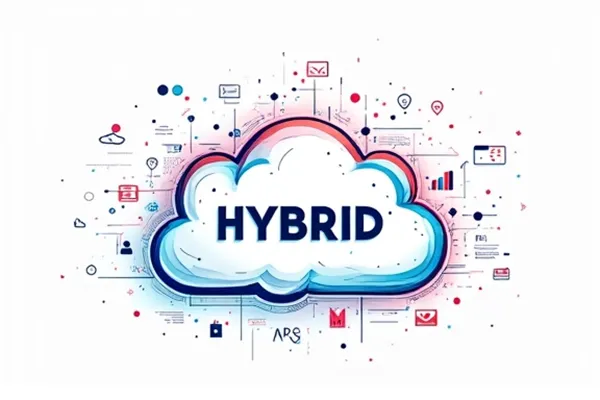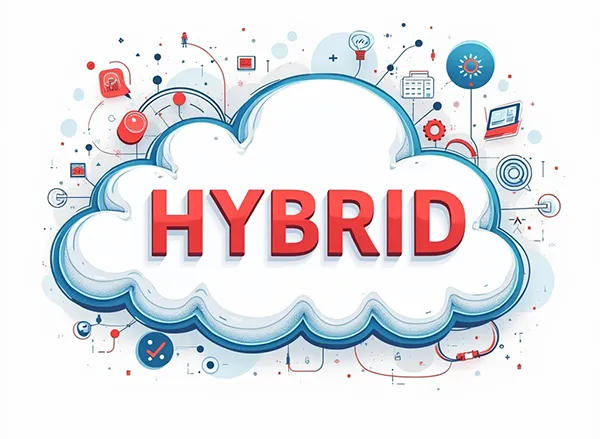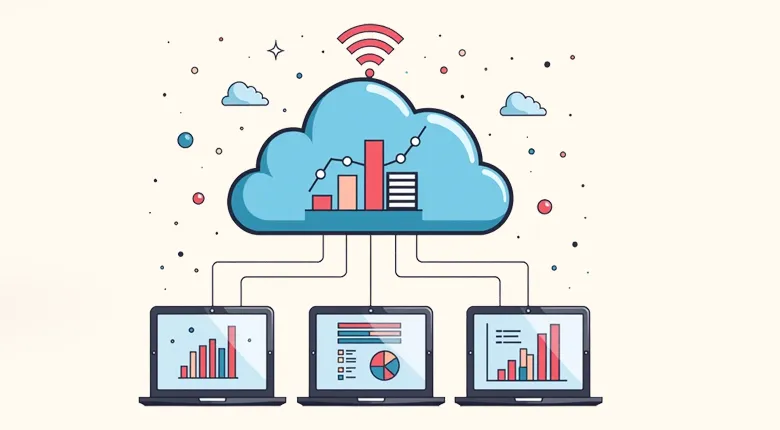As businesses continue to adopt cloud computing, the need for a flexible, scalable, and cost-effective solution has become more evident. Enter Hybrid Cloud a computing environment that combines public and private cloud infrastructures to deliver the best of both worlds. In this guide, we will explore what a hybrid cloud is, how it works, and why businesses are increasingly turning to it for their cloud strategy.
What is Hybrid Cloud?

A Hybrid Cloud is a cloud computing model that integrates both public cloud (third-party cloud services like AWS, Google Cloud, or Microsoft Azure) and private cloud (dedicated, on-premises infrastructure). This setup allows organizations to leverage the scalability and cost benefits of public clouds while maintaining the security and control of private clouds.
How Hybrid Cloud Works
Hybrid cloud systems operate by enabling data and application portability across public and private environments. Businesses can run specific workloads in a private cloud while utilizing the public cloud for additional computing power, backup, or disaster recovery. This flexibility allows for:
Dynamic Workload Management – Moving workloads between environments based on demand.
Data Compliance and Security – Storing sensitive data in a private cloud while using public cloud resources for less-sensitive tasks.
Cost Optimization – Scaling operations without over-investing in physical infrastructure.
What Exactly Is Hybrid Cloud Hosting?
Hybrid Cloud Hosting is a hosting model that combines public and private cloud infrastructures, creating a unified environment where workloads can move seamlessly between both. This setup gives businesses the flexibility to keep sensitive or mission-critical applications on private servers while tapping into the on-demand scalability of the public cloud.
From a technical standpoint, hybrid environments are built to share data and workloads through secure connections, often using APIs, VPNs, or dedicated lines. This allows IT teams to dynamically allocate resources depending on performance requirements, cost targets, or compliance needs.
For example, a financial firm in the USA might use a private environment for regulated transaction data, while deploying its customer-facing analytics on a Cloud Hosting platform to ensure scalability during peak usage. The same logic applies to UAE enterprises, balancing regional compliance with global reach.
Core Components of a Hybrid Cloud Architecture
A successful hybrid cloud architecture depends on four main building blocks: the private cloud, the public cloud, a robust network layer, and management tools that unify them. The private cloud offers security and control, while the public cloud delivers elasticity and geographic distribution.
Connectivity between the two environments is critical. Many enterprises use high-speed dedicated connections to minimize latency, ensuring real-time application performance. Tools like orchestration platforms and monitoring dashboards give administrators a single pane of glass to manage resources across environments.
Security is layered across both infrastructures, with encryption, firewalls, and identity management ensuring that only authorized entities access data. When built correctly, this architecture can rival the resilience of dedicated hosting while keeping the operational flexibility of cloud solutions.
Key Benefits of Hybrid Cloud (Flexibility, Cost Efficiency, and Security
Enhanced Flexibility and Scalability
Hybrid cloud architecture provides businesses with the ability to scale their resources dynamically based on demand. Organizations can maintain mission-critical applications and sensitive data in a secure private cloud while leveraging the public cloud for handling peak loads and additional storage needs. This flexibility ensures that businesses are never constrained by resource limitations, allowing them to adapt quickly to market fluctuations and business growth.
For example, an e-commerce platform can use a private cloud to store customer data and transaction records while utilizing the public cloud for handling increased traffic during seasonal sales events. This way, they get the best of both worlds—secure data storage and scalable computing power
without overspending on infrastructure.
Additionally, the hybrid cloud enables businesses to deploy applications in multiple environments, making it easier to test, develop, and launch new features without disrupting core operations. This adaptability is especially useful for companies with global user bases that require low-latency and high-performance cloud solutions.
One of the key financial advantages of hybrid cloud solutions is cost efficiency. Maintaining a 100% private cloud infrastructure can be extremely expensive due to the need for on-premise hardware, ongoing maintenance, and IT personnel. By integrating a public cloud component, businesses can reduce their capital expenditures while still ensuring data security and control over critical workloads.
For instance, a healthcare organization might store patient records on a private cloud for compliance reasons but use a public cloud to process non-sensitive data such as research analytics or machine learning workloads. This hybrid approach helps minimize infrastructure costs without compromising security or efficiency.
Hybrid cloud solutions also allow companies to implement a “pay-as-you-go” model for public cloud services, ensuring they only pay for the resources they use. This makes it easier to manage operational costs while still benefiting from the scalability and power of cloud computing.

Security and regulatory compliance are major concerns for businesses operating in industries such as finance, healthcare, and government sectors. Hybrid cloud solutions enable organizations to keep sensitive workloads and data in a controlled private environment while leveraging the cloud’s computational power for less sensitive operations.
For example, financial institutions can store customer account details in a private cloud while using the public cloud for front-end services like mobile banking applications. This ensures compliance with regulations like GDPR, HIPAA, and SOC 2, which require strict data protection and governance policies.
Additionally, hybrid cloud solutions offer advanced security features, such as end-to-end encryption, multi-factor authentication, and AI-driven threat detection. These features help businesses protect their data while benefiting from the innovation and cost savings offered by cloud computing.
Top Benefits of Hybrid Cloud Hosting for Businesses
One of the biggest advantages of hybrid cloud hosting is cost optimization. Companies can run baseline workloads on private infrastructure — already paid for or budgeted — and burst into the public cloud only when demand spikes. This “pay for what you use” model prevents overspending on idle resources.
Scalability is another key benefit. Businesses no longer need to guess their future capacity; instead, they can scale up instantly for product launches, seasonal campaigns, or global events. This flexibility is a huge advantage in competitive markets where speed can define success.
Finally, hybrid cloud enhances business resilience. If a public cloud region experiences downtime, workloads can be shifted to private resources without major disruption. For industries like healthcare or finance, where uptime is critical, this level of redundancy is invaluable.
How Hybrid Cloud Balances Public and Private Resources
The art of hybrid cloud management lies in knowing which workloads belong where. Public clouds handle fluctuating, compute-heavy, or globally distributed workloads, while private clouds safeguard sensitive applications and data sets.
This balance reduces costs by avoiding overprovisioning private resources while ensuring compliance and security for regulated workloads. A retail company might run its seasonal sales platform in the public cloud while keeping customer records in a private database.
Advanced resource schedulers can shift workloads dynamically, reacting to traffic spikes or downtime events. This agility lets hybrid setups maintain performance even when demand shifts unexpectedly — a key reason enterprises are moving away from purely static hosting models.
Common Use Cases in the USA and UAE Markets
In the USA, hybrid cloud is heavily adopted in sectors such as finance, healthcare, and e-commerce. These industries face strict regulations on sensitive data while also needing the public cloud’s reach for customer-facing services. The hybrid approach offers the best of both worlds.
In the UAE, the flexibility of hybrid cloud suits industries experiencing rapid growth and market diversification. For example, tourism companies can use private infrastructure for customer data, while relying on public cloud resources for high-traffic booking portals.
Hybrid setups also support emerging technologies like AI and IoT, enabling global data ingestion through public endpoints while processing and storing sensitive components locally — a crucial need in regulated or high-security environments.
Hybrid Cloud vs Traditional Hosting: Key Differences
Traditional hosting models, like dedicated or shared Hosting, often lack the dynamic scaling and workload distribution that hybrid cloud offers. In a static environment, you either over-provision and waste resources or under-provision and risk performance issues.
Hybrid cloud provides a far more fluid model, allowing workloads to move based on performance, cost, or compliance factors. This is particularly beneficial for enterprises with unpredictable demand patterns.
From a security standpoint, traditional hosting keeps everything in one environment, while hybrid offers a multi-layered approach — sensitive data can remain isolated while public-facing applications leverage the scalability of Cloud Hosting.
Cost Optimization Strategies in Hybrid Cloud Environments
Effective cost management in a hybrid cloud starts with right-sizing private resources. Overbuilding your private cloud leads to wasted capital; underbuilding forces you into unnecessary public cloud spend. A careful assessment of baseline workloads is key.
Another strategy is workload profiling categorizing applications by performance needs, compliance requirements, and cost sensitivity.
This allows businesses to assign workloads to the most cost-effective environment without sacrificing performance.
Finally, automation plays a huge role. Orchestration tools can spin up or tear down public cloud resources in real time, ensuring you only pay for extra capacity when it’s needed. This model mirrors the efficiency principles seen in advanced VPS Hosting setups.
Security and Compliance in Hybrid Cloud Deployments
Security in a hybrid cloud is built on layered defenses. Private clouds house sensitive data in tightly controlled environments, while public clouds use robust encryption and global security frameworks to protect workloads in transit and at rest.
Compliance adds another dimension.
In the USA, industries must adhere to regulations like HIPAA, SOC 2, and PCI DSS, while in the UAE, data sovereignty and financial compliance laws shape deployment strategies. Hybrid cloud allows each workload to be placed in the environment that best meets its compliance needs.
Technologies like identity and access management (IAM), multifactor authentication, and continuous monitoring are essential for securing hybrid setups. This approach mirrors best practices seen in secure Dedicated Server Hosting environments, where access control and monitoring are non-negotiable.
Hybrid Cloud for High-Performance Applications
Some applications demand consistently high performance — think real-time analytics, video streaming, or high-frequency trading systems. Hybrid cloud lets you place these workloads on optimized private hardware while using public cloud for scaling during spikes.
By running performance-sensitive operations on dedicated, high-spec infrastructure, latency is minimized, and throughput is maximized. This is especially important for workloads like AI inference or complex simulations that require predictable compute power.
Public cloud resources act as a performance booster when usage spikes. For example, during a product launch or global event, your private environment can seamlessly offload non-critical tasks to the public cloud to maintain speed where it matters most.
Hybrid cloud enables businesses to optimize their IT infrastructure by running workloads in the most suitable environment. By placing latency-sensitive applications closer to end-users while leveraging the power of cloud computing for AI and big data processing, businesses can enhance performance and efficiency.
For example, a video streaming company can use private cloud resources to store and cache frequently accessed content while utilizing the public cloud for transcoding and distributing content to a global audience. This hybrid approach ensures smooth streaming with minimal buffering, improving the user experience.
Similarly, businesses that rely on artificial intelligence, machine learning, and data analytics can leverage hybrid cloud environments to process large datasets efficiently. While private clouds handle sensitive customer data, public cloud services provide the necessary computing power to analyze trends and generate insights at scale.
Disaster Recovery and Business Continuity with Hybrid Cloud
Hybrid cloud offers built-in redundancy for disaster recovery. By replicating data and workloads across both private and public clouds, businesses can quickly switch environments if one becomes unavailable.
This model also supports geo-redundancy, meaning workloads can be mirrored in multiple geographic regions to ensure uptime even during regional outages. In industries like e-commerce and finance, this can be the difference between business as usual and costly downtime.
With a hybrid cloud, recovery time objectives (RTO) and recovery point objectives (RPO) can be reduced dramatically. Leveraging public cloud for backups complements traditional methods used in Bare Metal Server setups, delivering a more flexible safety net.

Business Continuity and Disaster Recovery
A hybrid cloud is an excellent solution for disaster recovery and business continuity. By keeping critical workloads in a private cloud while utilizing public cloud resources for backup and redundancy, businesses can minimize downtime and ensure seamless operations even during unexpected disruptions.
For example, a retail company can store customer order histories and inventory databases in a private cloud while backing up all data to a public cloud storage service. If the private cloud experiences an outage, the public cloud can take over temporarily, ensuring uninterrupted service for customers.
With automated failover mechanisms and geographically distributed data centers, hybrid cloud setups offer businesses a robust strategy to protect against data loss, cyberattacks, and system failures. This resilience is particularly valuable for companies that operate in highly regulated industries where data availability and uptime are crucial.
Integrating Hybrid Cloud with Existing IT Infrastructure
A smooth integration between hybrid cloud and existing IT systems starts with compatibility checks. Legacy applications may need updates or middleware to function effectively in a hybrid environment.
Connectivity is key — high-speed, secure links between environments ensure that workloads can move without bottlenecks. Many enterprises use direct connections like AWS Direct Connect or Azure ExpressRoute to tie hybrid systems together.
Integration also requires unified management tools. A central dashboard allows IT teams to monitor and manage workloads across both environments, similar to how advanced cPanel Hosting setups provide one control panel for multiple services.
Best Practices for Managing Hybrid Cloud Workloads
Managing hybrid cloud workloads effectively starts with clear workload classification. Determine which applications are mission-critical, which are sensitive, and which are best suited for the scalability of the public cloud. This classification ensures optimal placement and resource allocation.
Automation is another best practice. Using orchestration tools, workloads can be shifted between environments automatically based on performance metrics or cost triggers. This eliminates human error and ensures that the system adapts in real-time to changing conditions.
Finally, continuous monitoring is non-negotiable. Leveraging solutions that track CPU, memory, storage, and network performance across environments similar to advanced VPS Hosting setups helps maintain performance and prevent bottlenecks before they impact users.
Choosing the Right Hybrid Cloud Hosting Provider
Selecting a provider involves more than just checking technical specs. Businesses should evaluate data center locations, compliance certifications, and service-level agreements (SLAs) to ensure alignment with operational needs.
In the USA, compliance with standards like FedRAMP or HIPAA may be essential, while in the UAE, data sovereignty and local regulations must be prioritized. The provider’s ability to offer hybrid-ready infrastructure is critical to long-term success.
Additional factors include integration support, transparent pricing, and robust security offerings. Choosing a provider with experience in both private and public cloud management — much like seasoned Cloud Hosting companies — ensures a smoother transition and ongoing stability.
Future Trends: AI, Edge Computing, and Hybrid Cloud
Hybrid cloud is evolving alongside cutting-edge technologies. AI-driven workload management is already enabling predictive scaling, cost optimization, and automated security responses, reducing the need for manual oversight.
Edge computing is another major trend. By processing data closer to the source — in branch offices, factories, or retail outlets — edge nodes reduce latency and complement the core hybrid cloud architecture.
In 2025 and beyond, expect hybrid clouds to integrate more tightly with AI and IoT ecosystems, creating infrastructure that is not only reactive but predictive, helping businesses stay ahead in competitive industries.
Case Studies: Successful Hybrid Cloud Implementations
A large U.S. healthcare provider migrated sensitive patient data to a private environment while hosting its patient portal on the public cloud. This improved security and compliance without sacrificing user experience.
In the UAE, a retail chain adopted a hybrid cloud to handle e-commerce spikes during seasonal promotions. The private cloud managed inventory systems, while the public cloud handled front-end traffic, ensuring uptime and responsiveness.
A global logistics company used hybrid cloud to integrate IoT sensors in its fleet, processing data locally for real-time decisions and syncing summaries to the public cloud for analytics. These examples show the practical impact of hybrid cloud in diverse sectors.
Use Cases of Hybrid Cloud
Financial Services
Banks and financial institutions require a highly secure infrastructure to manage customer transactions and financial records. A hybrid cloud allows them to store sensitive financial data in a private cloud while utilizing public cloud resources for front-end applications such as mobile banking, customer service chatbots, and fraud detection analytics. This ensures compliance with industry regulations while providing seamless digital banking experiences.
For example, a bank might use a private cloud for account management and payment processing while employing AI-driven fraud detection systems hosted on the public cloud. This setup enhances security while leveraging the computational power of AI for real-time transaction monitoring.
Healthcare
Medical institutions and healthcare providers must comply with strict data privacy regulations like HIPAA, ensuring that patient records remain confidential and secure. A hybrid cloud solution enables healthcare organizations to store patient data on private cloud infrastructure while using public cloud services for AI-driven diagnostics, research analytics, and telemedicine platforms.
For example, a hospital can use a private cloud to maintain electronic health records (EHRs) while leveraging public cloud resources for analyzing anonymized medical data to improve treatment outcomes. This setup allows for advanced medical research and AI-driven healthcare innovations while keeping patient data protected.
E-commerce
Online retailers experience traffic fluctuations, particularly during major sales events like Black Friday and Cyber Monday. A hybrid cloud allows e-commerce businesses to scale their web servers and payment processing systems on-demand, ensuring that their websites remain responsive during high-traffic periods.
For example, an e-commerce company can keep customer databases, payment gateways, and order management systems in a private cloud while using the public cloud to handle sudden traffic spikes. This ensures a smooth shopping experience without compromising data security.
Enterprise IT
Many enterprises still rely on legacy applications that are difficult to migrate entirely to the cloud. Hybrid cloud allows businesses to integrate their legacy IT infrastructure with modern cloud solutions, enhancing functionality, scalability, and security.
For example, a large corporation might keep its internal ERP and HR management systems in a private cloud while leveraging public cloud services for collaboration tools, CRM applications, and customer support platforms. This integration ensures that businesses can modernize their IT environment without overhauling their existing infrastructure.
Is Hybrid Cloud Right for Your Business?
The choice to adopt a hybrid cloud strategy depends on your business needs, budget, and security requirements. If your organization requires a balance between cost efficiency, performance, and security, a hybrid cloud can be an ideal solution.
At Rackset, we specialize in cloud solutions that help businesses integrate and manage hybrid cloud environments. Whether you need a private cloud, public cloud, or a seamless hybrid solution, our experts can guide you through the process.
Conclusion
Hybrid cloud is revolutionizing the way businesses approach IT infrastructure. By combining the best of public and private clouds, companies can achieve greater flexibility, security, and scalability. As technology evolves, hybrid cloud will continue to be a strategic choice for organizations aiming to optimize their cloud resources.
Looking to implement a hybrid cloud for your business? Contact Rackset today to explore tailored cloud solutions that align with your growth strategy.
Hybrid cloud computing is an ideal solution for businesses that require a balance of scalability, cost efficiency, security, and performance. By strategically using both private and public cloud environments, organizations can achieve greater flexibility, improved compliance, disaster recovery capabilities, and optimized workload distribution.
Industries such as finance, healthcare, e-commerce, and enterprise IT continue to adopt hybrid cloud solutions to address their evolving IT needs. As cloud technology advances, businesses that leverage hybrid cloud architectures will benefit from enhanced innovation, competitive advantages, and long-term sustainability in the digital landscape.
Hybrid Cloud Hosting offers unmatched flexibility, scalability, and control. Blending private and public resources, it enables businesses to adapt instantly to changing workloads, maintain compliance, and optimize costs.
For organizations that want to innovate without compromising performance, hybrid cloud provides a strategic advantage in 2025 and beyond. Whether in the USA or the UAE, this model empowers companies to future-proof their infrastructure and stay competitive in fast-moving markets.
If you’re ready to explore virtualization and dynamic workload management further, VPS Hosting is the next step, offering even more customization and control for specialized use cases.

Leave a Reply